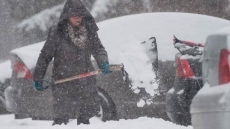OTTAWA — Call it cold comfort, but Atlantic Canada was one of the only regions on the planet that had cooler-than-average temperatures last year, according to Environment Canada.
On a day when NASA officially announced the hottest average global temperature — by a statistically significant margin — ever recorded in 136 years of modern record-keeping, Canada as a whole experienced merely its 11th warmest year in 2015.
The data helps illustrate a wild weather year that was influenced by both a powerful El Nino in the Pacific Ocean and what NASA describes as global climate change "largely driven by increased carbon dioxide and other human-made emissions into the atmosphere."
According to both NASA and the U.S. National Oceanic Atmospheric Administration, which measures the Earth's surface temperature in a slightly different way, 2015 averaged 14.79 degrees C, the hottest since 1880 when records began. And it beat the previous 2014 record by roughly one quarter of a degree, the second largest year-over-year margin.
Canada, as a northern nation, generally experiences greater-than-global-average impacts from climate change, but 2015 was no normal year.
In fact, David Phillips, the senior climatologist at Environment and Climate Change Canada, says only a very hot autumn likely kept all of eastern Canada from experiencing an abnormally cool year.

Overall, Canada's average temperature from Jan. 1 to Dec. 31 was up 1.3 degrees Celsius from the historic average measured over the last 68 years
However that national average hides some massive regional temperature swings, including record-breaking averages across British Columbia and Yukon, the third warmest year on record for the southern Prairies and the fifth warmest for the Mackenzie delta in the Northwest Territories.
Contrast that with Atlantic Canada, which Phillips says was one of the very few regions on the planet that experienced a colder-than-average 2015.
"There were only two areas in the world that were actually cooler than normal," in NOAA data sets late last fall, said the climatologist.
One was a tiny area in southern Argentina. The other was eastern Canada.
The Great Lakes region in central Canada was just 0.3 degrees C above average, recording its 28th warmest year of the last 68.
Chalk that up to a bitterly cold winter in the eastern half of the country.

"People were thinking it was a global warming hoax when the world announced the warmest winter on record — because we were going through one of the coldest in Ontario, Quebec and Atlantic Canada," said Phillips.
That was followed by the warmest fall on record in much of central Canada, as it finally caught up with the western half of the country.
Phillips said Canada overall has been warmer than normal for 19 consecutive years, while globally 14 of the 15 warmest years ever recorded have occurred since 2000.
He also notes a "head-shaking" statistic: the last time the planet recorded a record average low temperature was 1916.
So while 2015 was "no screaming hell" in Canada, says Phillips, "we know that the world is warmer now."





